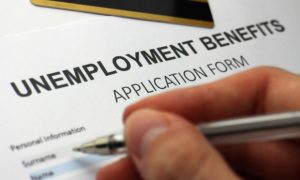A recent report from researchers supported by the University of Chicago found that, in a matter of weeks, the economy has seen widespread labor reallocation, resulting in some job creation but many more job losses, and that this "shock" will have long-term consequences in slowing down recovery.
A May 5 working paper from the school's Becker Friedman Institute for Economics found there were three new hires for every 10 layoffs caused by the shock in labor demand. The report estimates that 42% of recent layoffs will result in permanent job loss.
The COVID-19 pandemic and efforts to contain the virus "are exacting a staggering economic toll in countries around the world," said the report, noting in the United States alone, nearly 28 million people filed new claims for unemployment benefits over the six-week period ending April 25. Many analysts project the U.S. economy will shrink at a rate of 25% or more in the second quarter, the report said
Even as much of the economy is shuttered, some businesses are expanding in response to demand shifts, said the report, quoting news reports of the "fast reallocation of labor since World War II" with companies and governments mobilizing workers into urgently-needed activities. "In other words, Covid-19 is also a major reallocation shock," said the report.
For instance, of April 18, Walmart hired 150,000 new employees in the span of a month and plans to hire 50,000 more; Amazon hired 100,000 new employees in recent weeks and aims to hire another 75,000; and Instacart is adding 300,000 shoppers to its payroll, the report said, citing news reports.
But even if medical advances or natural forces bring an early resolution to the crisis, "many pandemic-induced shifts in consumer demand and business practices will persist," said the reporting, noting much of the near-term job reallocation will also persist.
In estimating that 42% of recent pandemic-induced layoffs will result in permanent job loss, the report said "there will be profound, long-term consequences for the reallocation of jobs, workers and capital across firms and locations" if the pandemic and partial economic shutdown linger for many months, or if high mortality rates reoccur.
The authors predict a "drawn-out economic recovery," noting, historically, job creation responses to major reallocation shocks lag destruction responses by a year or more.
The authors — Jose Maria Barrero, Nick Bloom and Steven J. Davis — said policy responses can further slow the recovery, such as unemployment benefit levels that exceed earnings for many American workers and policies that subsidize employee retention regardless of the employer's longer-term outlook.
"If we are correct that many of the lost jobs are gone for good, there are important implications for policy," the report said.
© 2025 ALM Global, LLC, All Rights Reserved. Request academic re-use from www.copyright.com. All other uses, submit a request to [email protected]. For more information visit Asset & Logo Licensing.








